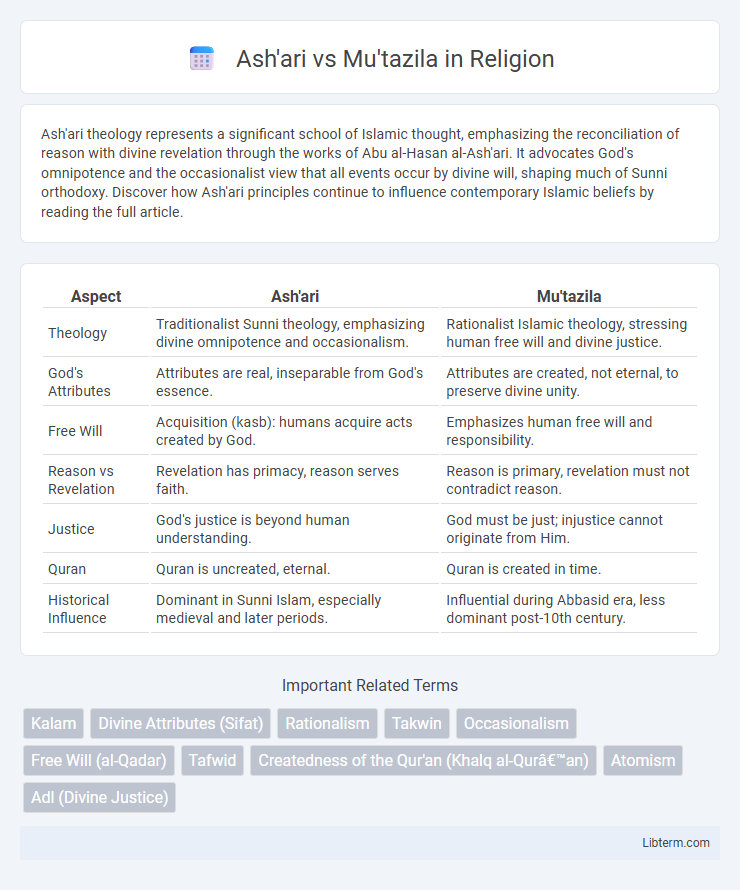Ash'ari theology represents a significant school of Islamic thought, emphasizing the reconciliation of reason with divine revelation through the works of Abu al-Hasan al-Ash'ari. It advocates God's omnipotence and the occasionalist view that all events occur by divine will, shaping much of Sunni orthodoxy. Discover how Ash'ari principles continue to influence contemporary Islamic beliefs by reading the full article.
Table of Comparison
| Aspect | Ash'ari | Mu'tazila |
|---|---|---|
| Theology | Traditionalist Sunni theology, emphasizing divine omnipotence and occasionalism. | Rationalist Islamic theology, stressing human free will and divine justice. |
| God's Attributes | Attributes are real, inseparable from God's essence. | Attributes are created, not eternal, to preserve divine unity. |
| Free Will | Acquisition (kasb): humans acquire acts created by God. | Emphasizes human free will and responsibility. |
| Reason vs Revelation | Revelation has primacy, reason serves faith. | Reason is primary, revelation must not contradict reason. |
| Justice | God's justice is beyond human understanding. | God must be just; injustice cannot originate from Him. |
| Quran | Quran is uncreated, eternal. | Quran is created in time. |
| Historical Influence | Dominant in Sunni Islam, especially medieval and later periods. | Influential during Abbasid era, less dominant post-10th century. |
Introduction to Ash'ari and Mu'tazila Schools
The Ash'ari school, founded by Abu al-Hasan al-Ash'ari in the 10th century, emphasizes divine revelation and the transcendence of God's attributes, advocating a middle path between rationalism and traditionalism in Islamic theology. The Mu'tazila school, emerging in the 8th century, prioritizes reason and rational thought, promoting concepts like divine justice and human free will, often interpreting Qur'anic texts metaphorically to align with logic. These two schools represent contrasting approaches to understanding God's nature, scripture, and human morality within Islamic scholastic tradition.
Historical Context and Origins
The Ash'ari school originated in the 10th century CE as a response to the rationalist Mu'tazila movement, which emerged in the 8th century during the Abbasid Caliphate, advocating for reason and free will in theology. The Mu'tazila's emphasis on divine justice and unity led to significant theological debates, especially during the Mihna (inquisition) under Caliph Al-Ma'mun. In contrast, Ash'arism sought to reconcile traditional Islamic beliefs with rational thought while affirming God's attributes and occasionalism, shaping Sunni orthodoxy.
Core Theological Principles
The Ash'ari school emphasizes divine omnipotence and occasionalism, asserting that God's will is absolute and human reason is subordinate to revelation, while affirming the attributes of God without anthropomorphism. The Mu'tazila prioritize rationalism and uphold God's justice and unity, advocating for human free will and the use of reason to interpret scripture, often rejecting literal divine attributes. These core theological principles distinguish Ash'ari theology, which balances faith and reason within traditionalism, from Mu'tazila theology, rooted in rationalist and ethical monotheism.
Concept of God’s Attributes
The Ash'ari school asserts that God's attributes are real and eternal, affirming their existence alongside His essence without compromising monotheism. In contrast, the Mu'tazila emphasize God's absolute unity by interpreting attributes metaphorically to avoid attributing multiplicity to His essence. This fundamental difference shapes their theological discourse on divine nature and influences Islamic doctrinal development.
Free Will vs Predestination
The Ash'ari school emphasizes divine predestination (qadar) while allowing human free will within God's omnipotent decree, advocating a middle ground known as acquisition (kasb) where humans acquire actions created by God. In contrast, the Mu'tazila strongly uphold human free will and moral responsibility, rejecting absolute predestination to preserve divine justice and human accountability. This theological debate highlights differing views on God's sovereignty and human agency in Islamic thought, significantly impacting Islamic philosophy and jurisprudence.
Reason and Revelation: Epistemology
The Ash'ari school emphasizes divine revelation as the primary source of knowledge, asserting that reason has limits in comprehending God's attributes and the unseen world, thus prioritizing faith over rationalism. The Mu'tazila advocates for the supremacy of reason in interpreting revelation, arguing that human intellect can discern ethical truths and theological concepts independently of textual authority. This epistemological debate underpins the Ash'ari's occasionalism and Mu'tazila's rationalism, shaping Islamic theology's approach to knowledge, ethics, and the nature of God.
Views on the Qur’an: Created or Uncreated?
The Ash'ari school affirms the Qur'an as the uncreated, eternal speech of God, emphasizing its divine origin and immutability. In contrast, the Mu'tazila assert that the Qur'an is created in time to preserve God's uniqueness and prevent eternal multiplicity alongside Him. This theological divergence significantly influenced Islamic doctrinal development and debates on divine attributes and revelation.
Role of Human Intellect in Theology
The Ash'ari school emphasizes human intellect as limited in comprehending divine attributes and relies on revelation to resolve theological questions, asserting God's omnipotence beyond rational logic. In contrast, the Mu'tazila assigns a central role to human reason, arguing that intellect can independently discern ethical truths and divine justice through rational inquiry. This fundamental difference shapes their respective doctrines on God's nature, free will, and morality within Islamic theology.
Influence on Islamic Thought and Jurisprudence
The Ash'ari school, emphasizing divine sovereignty and occasionalist causality, profoundly shaped Sunni orthodoxy and jurisprudence by reinforcing traditionalist interpretations and limiting rationalist approaches in fiqh. In contrast, the Mu'tazila advocated for human free will and rationalism, influencing early Islamic theology with a focus on justice and reason, though their impact waned in legal dominance. This intellectual divergence between Ash'ari and Mu'tazila underpins key debates in Islamic thought on divine attributes, human accountability, and the role of reason in interpreting Sharia.
Legacy and Contemporary Relevance
Ash'ari theology shaped Sunni orthodoxy by emphasizing divine revelation and occasionalism, influencing Islamic jurisprudence and creed for centuries. The Mu'tazila's rationalist approach, advocating for justice and human free will, impacted Islamic philosophy and modern theological debates on reason and ethics. Contemporary scholars revisit both schools to address issues of faith, reason, and pluralism in Muslim societies.
Ash'ari Infographic

 libterm.com
libterm.com